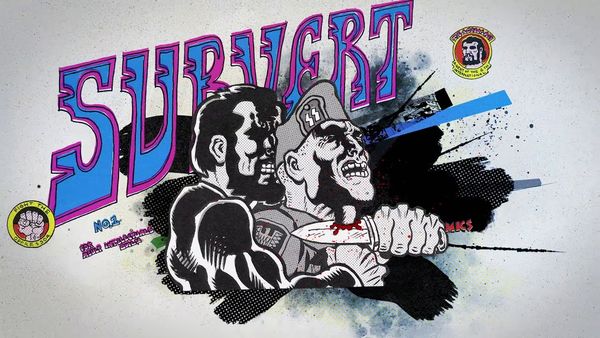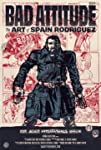Eye For Film >> Movies >> Bad Attitude: The Art Of Spain Rodriguez (2021) Film Review
Bad Attitude: The Art Of Spain Rodriguez
Reviewed by: Paul Risker

Bad Attitude: The Art of Spain Rodriguez is filmmaker Susan Stern’s personal exploration of the man she has called her partner in life and art. It’s a journey driven by her desire to grapple with how she herself felt about her husband’s work, presenting to us an unflinching critique, unafraid of discussing the most controversial aspects of his personality and art. Through contributions from comic luminaries Robert Crumb, Art Spiegelman, Trina Robbins, Aline Kominsky Crumb, and Ed Piskor, Stern tells the broader story of underground comics of the 1960s and comics in America.
Coming in at a short 71 minutes, Stern captures Spain’s creative energy and charisma. If there are limitations as to what can be shown of him in this tight window, it’s a portrait of a life lived that’s intriguing, and in moments uncomfortably so. There was the gay-bashing incident of his youth, to riding with an outlaw biker club, and his depiction of women is also a source of controversy. An imperfect person, we find ourselves drawn to him, and in other moments repelled by him, that provokes us to think about whether we should turn the film off. What strikes us is that he's a work in progress, even a reformer by educating his biker brothers to draw them away from fascist ideology, and the impact of the birth of his daughter reveals a gentle and paternal love.

In as much as Stern herself is left to grapple with her own feelings towards Spain’s work, she does not spare us from deciding for ourselves how we feel about the man and the artist. She offers us a portrait, sharing episodes from his life, but does not instruct or try to influence us how we should feel.
Our feelings mimic Spain's black and white illustrations, viscerally opposing one another, and by its conclusion, we find ourselves lost in the grey. We should think of Bad Attitude as a litmus test for our values of compassion, empathy and understanding – it can tell us something about who we are. It’s not about acquitting or condemning him for his flaws, but accepting that like all of us, he’s an imperfect person, a work in progress.
For those with neither an interest in or knowledge of comics, Stern’s documentary is still an engaging work. All it requires from us is an interest in people, and how lives intersect with culture and politics. In the way one period of Spain’s life can contradict another, revealing a changing landscape of his own inner thoughts and feelings, he’s a metaphor or a visual representation of how society is always changing. It’s a story that must intersect with culture and politics because the medium and the men and women working to shape it were a part of a changing world, in the particularly heightened period of the 60s and 70s. We see the interest in socialist thought through Spain, and the controversy of how he drew women and his interaction with female artists, opens up the story of women’s history in a crucial period.
Bad Attitude is a visually engaging film, conveying the vibrant visions of the comic book illustrators, and yet with other footage shot in Spain’s home, Stern conveys the intimate humanity of the person behind the art. Every story is incomplete, it’s what the author leaves in versus what they leave out. The story of comics is a big subject and one that’s too broad to tell comprehensively, as is the story of any one person’s life. Stern tells the bits of the story that can be pieced together through Spain and his peers, and for the story of her partner in life, simply tries to capture his spirit and not his life story.
Reviewed on: 26 Feb 2021
















